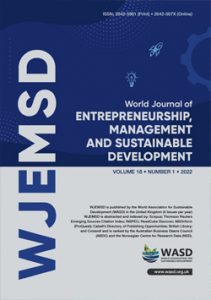Fractional Brownian dynamics in naira/dollar foreign exchange rates, Prof. Olusegun Ayadi
Prof. Olusegun Felix Ayadi
Department of Accounting and Finance
Texas Southern University, Houston, Texas
USA
Email: ayadi_fo@tsu.edu
DOI: 10.1108/WJEMSD-01-2013-0003
Purpose: This paper seeks to characterize the behavior of the naira/dollar foreign exchange rate series over the period 1999 through 2006 to determine if the process generating the series has long memory which is a special case of fractional Brownian motion. The existence of long memory contradicts the notion of market efficiency.
Design/methodology/approach: The paper employs the modified rescaled range R/S test which is proposed by Lo to test the null hypothesis that daily and weekly NGN/USD exchange rates from 1999 through 2006 exhibit short‐memory process. The second test that was also employed is the Geweke‐Porter‐Hubak (GPH) test which was refined by Hurvich et al.
Findings: The results show that long memory is present in daily and weekly foreign exchange level series of the Nigerian naira for the period sampled. This evidence implies that the Nigerian foreign exchange market may not be efficient. Thus, it is possible for investors to realize abnormal profit by taking an investment position based on predicted exchange rates. The results reported in this paper are also indicative of a deviation from long‐run PPP.
Originality/value: This paper is the first to empirically apply the modified R/S and GPH tests to explore the existence of long‐memory process in a country study of foreign exchange series using data from Nigeria.
Keywords: Long‐memory; Foreign exchange; Fractional Brownian motion; Rescaled R/S test; Nigeria.
Citation: Felix Ayadi, O. (2013), "Fractional Brownian dynamics in naira/dollar foreign exchange rates", World Journal of Entrepreneurship, Management and Sustainable Development, Vol. 9 No. 2/3, pp. 191-203. https://doi.org/10.1108/WJEMSD-01-2013-0003

